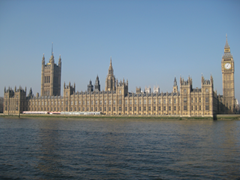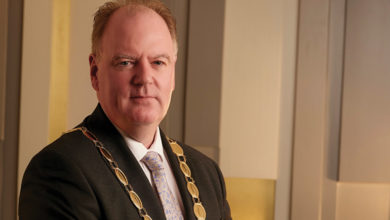Westminster and local justice
 Parliament still has a significant influence on law and order as important areas of justice policy are not devolved.
Parliament still has a significant influence on law and order as important areas of justice policy are not devolved.
The devolution of policing and justice in April 2010 was a major step forward for Stormont but, in practice, it was far from a complete transfer of power. Westminster remains responsible for the law in three main policy areas: illicit drugs, national security and politically sensitive matters covered by agreements during the peace process (see table).
Reserved powers (such as drugs policy) can be transferred to Stormont at a future date by secondary legislation i.e. an Order passed by both Houses of Parliament. Excepted matters (such as national security) can only be devolved through an entirely new Act of Parliament, a highly unlikely move.
Unionists are satisfied that the devolution settlement strikes the right balance between Stormont and Westminster. The only exception is the DUP’s demand to devolve separated status for prisoners, with a view to its abolition. Not surprisingly, nationalists want more powers transferred away from Westminster. Alliance does not rule out devolving further powers but says that David Ford’s priority is to review and reform those which are already devolved.
No major change is on the horizon as the Assembly’s current justice powers are just under two years old. Different policies in different parts of the UK could also be exploited by criminals, in the same way that the Irish border is exploited for organised crime.
Some politically sensitive transfers, though (e.g. on parading and prisoner status), may be forthcoming if the Executive can agree on alternatives.
National security
MI5 is accountable to the Home Secretary while MI6 and Government Communications Headquarters (GCHQ) report to the Foreign Secretary. All three services are scrutinised by Parliament’s Intelligence and Security Committee, chaired by Sir Malcolm Rifkind. The committee has no Northern Ireland members, although the DUP expected to receive a seat after the St Andrews Agreement. Instead, the party can receive security briefings on Privy Council terms.
Complaints about the intelligence services’ conduct can be taken to the Investigatory Powers Tribunal (chaired by Lord Justice Mummery), assisted by the Intelligence Services Commissioner (Sir Mark Waller) and the Interception of Communications Commissioner (Sir Paul Kennedy).
Nationalists have consistently called for MI5’s removal from Northern Ireland but unionists and Alliance support the status quo. Sinn Féin’s general election manifesto states: “All criminal investigations must take place under the auspices and authority of the policing service and its full accountability structures.”
SDLP Justice Spokesman Conall McDevitt claims that MI5 is “totally unaccountable” and its presence “gives a propaganda coup” to dissidents and “runs contrary to the spirit of the Good Friday Agreement.” He regards national security as an “unhelpful and unspecific” term as the local terrorism threat is “against this region and our island”. The PSNI also participates in a UK-wide counter-terrorism network.
Organised crime
The UK-wide Serious Organised Crime Agency (SOCA) was established in April 2006 and incorporated the Assets Recovery Agency in 2008. It reports to the Home Secretary. From 2013, SOCA will be merged into the new National Crime Agency, which will also cover border policing and cyber-crime.
Sinn Féin has condemned SOCA investigations as politically motivated while the SDLP says that organised crime is best tackled on an all-island level. It would devolve the functions of SOCA and its replacement agency to the Assembly.
The Misuse of Drugs Act has extended to Northern Ireland since it became law in 1971. The SDLP believes the Act is outdated and has called for the devolution of drugs classification.
For example, mephedrone was outlawed by the Home Secretary in April
2010 but that ban could have been brought forward sooner if the Health Minister had the power in Northern Ireland. New drugs could be temporarily banned until proven safe. The SDLP’s position is based on the subsidiarity principle (i.e. making decisions as close to the citizen as possible) and would make Northern Ireland law stricter than that in the rest of the UK. However, devolution could also be used to liberalise drugs laws and inconsistencies with Britain and the Republic would be exploited by criminals.
Judges
The UK Supreme Court is the ultimate court of appeal for civil and criminal cases. Northern Ireland is represented by one Supreme Court Justice, currently Lord Kerr of Tonaghmore. The court has heard judicial review cases from four Northern Ireland applicants since its establishment in October 2009:
• JR17 (declaring a pupil’s suspension to be unlawful, 23 June 2010);
• Raymond McCartney MLA (overturned murder conviction, 11 May 2011);
• Eamonn MacDermott (overturned murder conviction, 11 May 2011); and
• Brigid McCaughey (approval for new inquest into a killing by British soldiers, 18 May 2011).
All judges at county court level and above are Crown appointments. The Northern Ireland Judicial Appointments Commission (NIJAC) makes nominations up to high court level, which are then recommended to the Queen by the Lord Chancellor. The Lord Chief Justice and Lords Justice of Appeal are recommended directly by the Prime Minister.
The First Minister and deputy First Minister can appoint two of the 13 members of the NIJAC i.e. one barrister and one solicitor to represent the legal profession. The current appointees are James McNulty QC and Alastair Rankin, a Director at Cleaver Fulton Rankin.
Pre-devolution
Criminal law approved by Parliament before justice was devolved (on 12 April 2010) continues to have a significant impact on Northern Ireland e.g. the Bribery Act 2010 (effective from 1 July 2011). The Act introduces several new offences i.e. failure to prevent bribery, giving, promising or offering a bribe, and requesting, agreeing to receive or accepting a bribe either at home or abroad. The maximum penalty for bribery is raised from seven to 10 years’ imprisonment, with an unlimited fine. If Parliament now wishes to legislate on a devolved justice matter, the Bill must be subject to a legislative consent motion in the Northern Ireland Assembly.
| UK-wide justice powers | |||
| National security | General justice policy | Constitutional/other | |
| Excepted | Counter-terrorism Intelligence services Official secrets Treason |
Immigration offences Military justice system |
UK Supreme Court Appointment and removal of judges |
| Reserved | Non-jury trials Prohibited weapons Public order powers of armed forces Security of explosives (except fireworks) SOCA Stop and search powers |
Classification of controlled drugs Separated prisoner status Surveillance powers |
50:50 PSNI recruitment Public order at parades Royal prerogative of mercy (terrorism cases) |
Report sponsored by G4S





